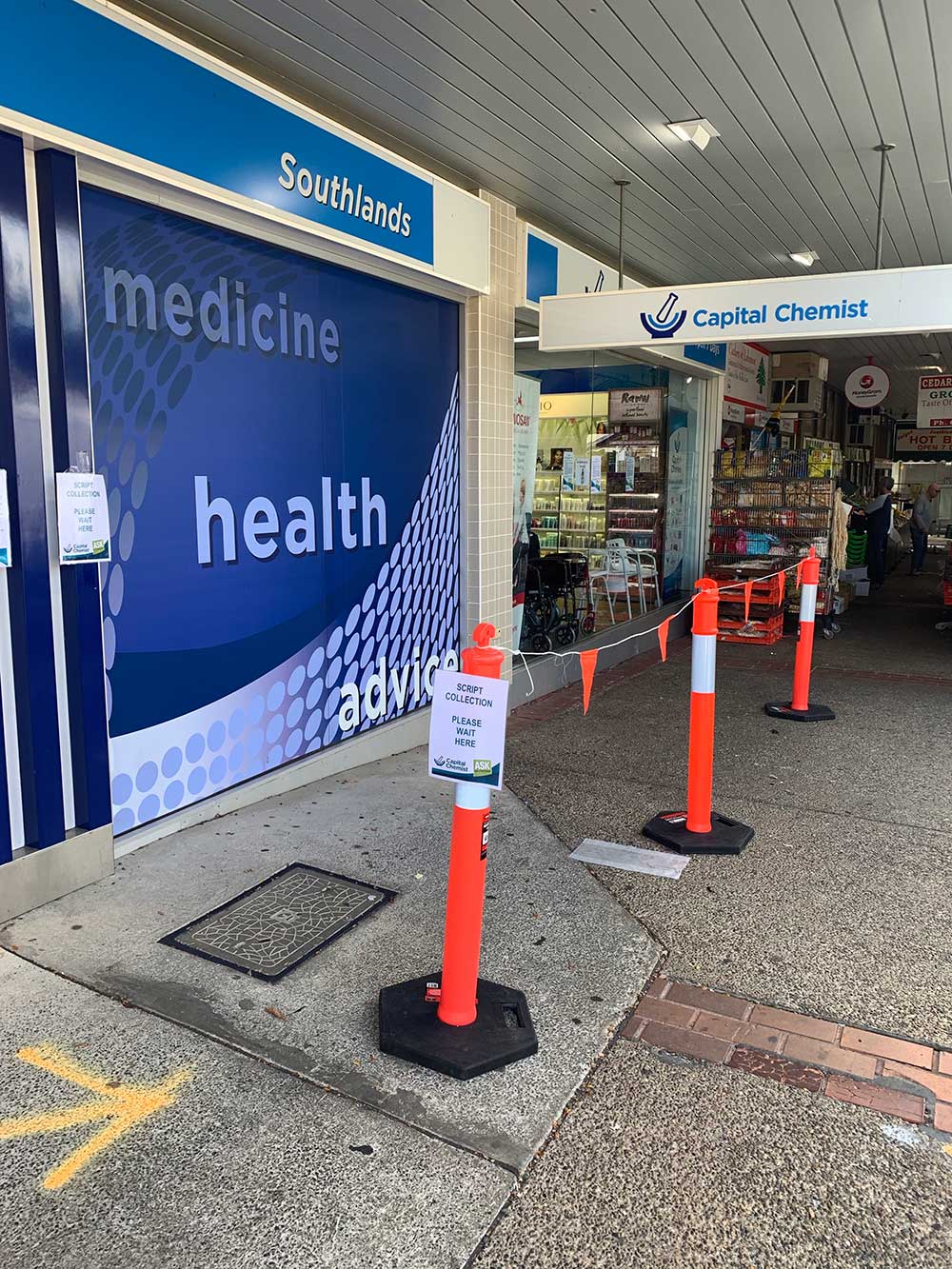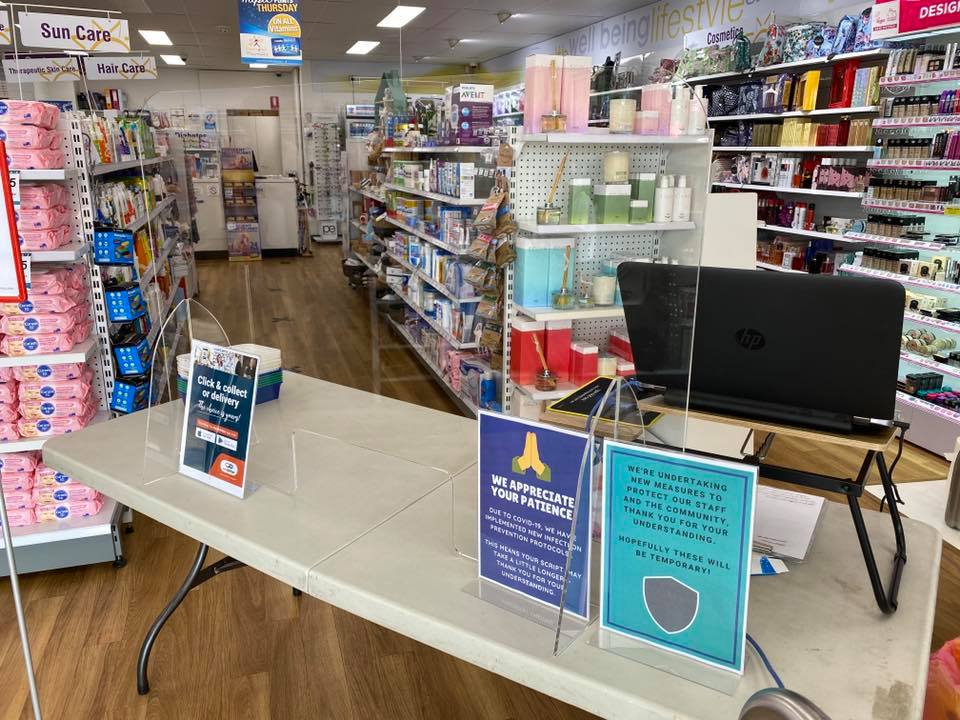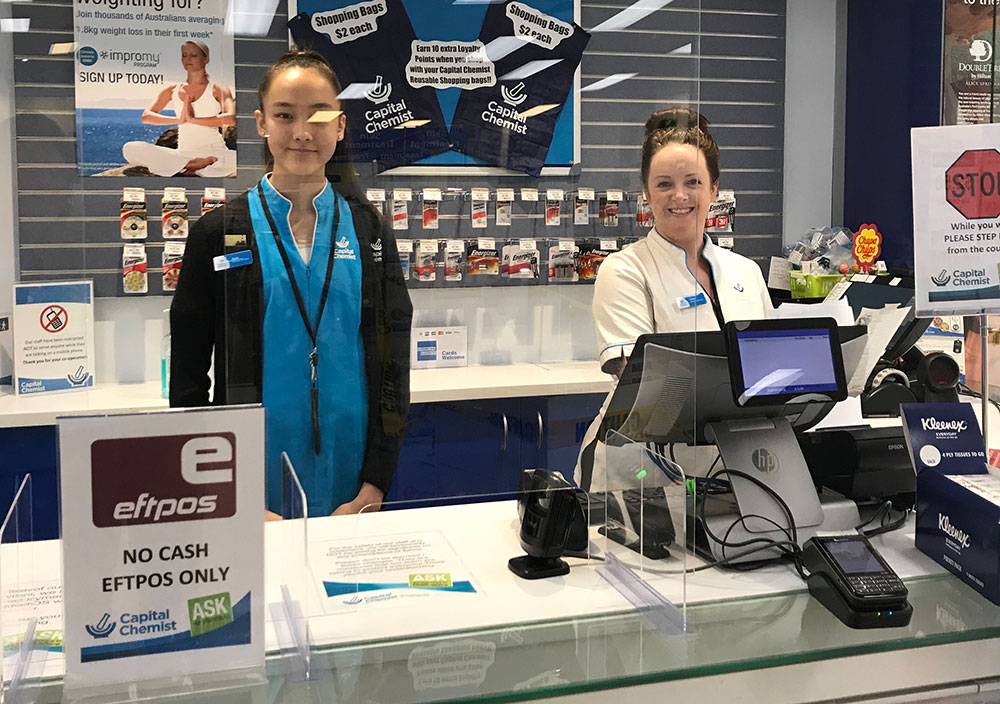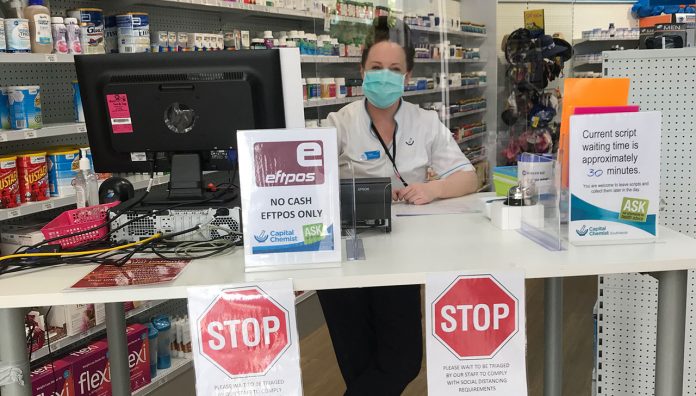As many Australians settle into a new normal of working from home, virtual meetings and social distancing, community pharmacies are finding ways to operate and even innovate in response to the COVID-19 pandemic.
Key points:
|
For pharmacist and co-owner of Capital Chemist Southlands Louise McLean MPS, adjusting to COVID-19 conditions is ongoing.
‘It has been a very fluid and dynamic process,’ Ms McLean said.
‘A lot of changes have been implemented in a very short period of time, such as changing our staff roster into two split teams over a period of 24 hours.’
Her location in the Canberra suburb of Mawson has also brought additional challenges.
‘Being in Canberra and going through the bushfires over December/January and then hail storms soon after, our base stress levels are higher than normal and we are all feeling the pressure,’ she said.
‘As a pharmacist working on the frontline we see the best and worst of human nature … I’m proud to say our team has never been stronger and our regular customers have been patient, appreciative and very understanding of changes in procedure to keep our staff and community as safe as possible.’
Restricted access

Ms McLean has set up a triage desk, covered with a sneeze guard, just inside the pharmacy. This includes a computer with access to the dispensing program, a point-of-sale system and printers, which means customers don’t need to venture further into the store.
‘We ensure we have a pharmacist and a pharmacy assistant at the triage desk and front door at all times to greet customers outside and as soon as they enter the store,’ she said.
‘Prescriptions are dropped off at the triage desk and the customer is sent a text message when their script is ready for collection … Over-the-counter item requests are managed by the floor staff with the items brought to the front.’
The only customers allowed beyond the front desk are: opioid maintenance therapy patients who need to enter for supervised dosing; flu vaccine patients; and people requiring urgent compression garment fittings.
Justin Smith, pharmacist and owner of Kooringal Pharmacy in Wagga Wagga in western New South Wales, has also moved to a triage system. He said it has been important to provide customers with a reasonable expectation of how long their prescription will take to dispense.
‘A few weeks ago we were close to double the number of scripts, and customers who would normally wait five minutes were suddenly waiting for 30 minutes,’ he said.
‘People were getting impatient, but giving them a timeframe has created a much calmer environment.’
Keep communication simple
Both Ms McLean and Mr Smith have used social media to update customers about changes to their pharmacies, as well as posting signs outside their stores.
Mr Smith said messaging should be kept simple so people don’t ignore it.

‘We’re trying to minimise the clutter as much as possible,’ he said.
‘We have some simple signs up saying things like, “We’re doing things differently” and “Thank you for your patience”.’
Increased hygiene practices
At the Southlands pharmacy, staff have been provided with hand sanitiser to use between every customer, isopropyl alcohol wipes, and masks and gloves – if required.
Dispensed prescriptions are placed in plastic bags in the dispensary to avoid customers handling baskets and each staff member has an individual pen on a lanyard.
Ms McLean has also implemented additional cleaning throughout the day, using a checklist to ensure everything gets done.
This includes using disinfectant wipes to regularly clean items such as phones, EFTPOS machines, fridge handles, staplers, printers, keyboards and computer mice, and chairs.
‘All of our chairs with upholstery in our waiting areas and consulting rooms have been replaced with fully plastic chairs so they can be regularly cleaned,’ she said.
‘The wipes used for cleaning are disposed of in our clinical waste disposal bins, rather than the normal bin and staff are advised to wear gloves while emptying the bins.’
Easier home deliveries
With vulnerable populations such as Australians aged over 70, those over 65 with pre-existing conditions and Indigenous people over 50 with pre-existing conditions urged to stay at home and isolate for their own protection, Ms McLean said she is encouraging customers to leave their prescriptions on file and to place orders electronically or over the phone.
‘We have also set up customer accounts so all payments for our home delivery service can be made electronically, so there is no cash handling or payment required at the time of the delivery,’ she said.
Mr Smith has opened different channels to make it as easy as possible for customers to have their medicines delivered.
‘We have people sending picture messages, emails, we’re collecting their script from an ice cream container outside their house – anything we can do to help our customers,’ he said.
‘We’re promoting that people should leave their scripts on file, particularly those over 70. We have pushed that on social media and through staff training, so when someone rings, staff know to suggest we hold their prescription for the next few months.’
Roster changes
Ms McLean recently made the decision to split her team in two. When creating the rosters, she kept family members together and separated staff with similar skill levels and roles.
‘We also took into consideration any family commitments as schools are closed, so some staff need to be at home with their children,’ she said.

Staff do a thorough clean down when there is a changeover between the teams. As splitting the team means reduced staff numbers on each shift, working hours – not pharmacy opening hours – have been increased to ensure there is enough time to get jobs done.
For example, rostered hours Monday to Friday are 7:30am to 8:00pm, while the pharmacy opening hours are 8:30am to 7:00pm.
‘Staff are advised to remove their shoes, wash all clothes and have a shower as soon as they get home and before seeing their family members/housemates,’ Ms McLean added.






 ‘We’re increasingly seeing incidents where alert fatigue has been identified as a contributing factor. It’s not that there wasn’t an alert in place, but that it was lost among the other alerts the clinician saw,’ Prof Baysari says.
‘We’re increasingly seeing incidents where alert fatigue has been identified as a contributing factor. It’s not that there wasn’t an alert in place, but that it was lost among the other alerts the clinician saw,’ Prof Baysari says.





